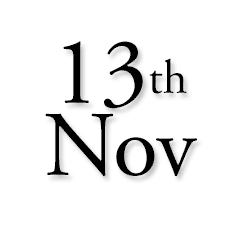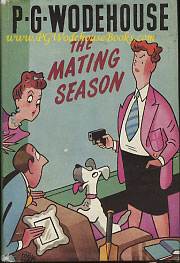A very nice Wodehouse documentary with the late Lt. Col. Norman Murphy shepherding a gaggle of American Wodehouseans. Features quite a lot of readings from Plum’s wartime diary.

A very nice Wodehouse documentary with the late Lt. Col. Norman Murphy shepherding a gaggle of American Wodehouseans. Features quite a lot of readings from Plum’s wartime diary.
 It would be hard to conceive of the person who does not like P.G. Wodehouse’s 1949 novel The Mating Season. It has so many things going for it: it’s part of the Totleigh Towers tetralogy involving Bertie Wooster’s off again/on again engagement to Madeline Bassett (and yet mercifully spares us the presence of that young gawd-help-us); there are enough impersonations to qualify this as a Blandings story; a rich cast of characters including newt fancier Gussie Fink-Nottle, the sparkling Corky Pirbright and her brother Catsmeat and although she was but a cameo, the enjoyable Hilda Gudgeon; a complete synopsis of that Rosie M. Banks classic Mervyn Keene, Clubman; an unusually blunt and physical Jeeves; a set piece that rivals the Market Snodsbury Grammar School speech; and finally, five aunts—“As far as the eye could reach, I found myself gazing on a surging sea of aunts.”
It would be hard to conceive of the person who does not like P.G. Wodehouse’s 1949 novel The Mating Season. It has so many things going for it: it’s part of the Totleigh Towers tetralogy involving Bertie Wooster’s off again/on again engagement to Madeline Bassett (and yet mercifully spares us the presence of that young gawd-help-us); there are enough impersonations to qualify this as a Blandings story; a rich cast of characters including newt fancier Gussie Fink-Nottle, the sparkling Corky Pirbright and her brother Catsmeat and although she was but a cameo, the enjoyable Hilda Gudgeon; a complete synopsis of that Rosie M. Banks classic Mervyn Keene, Clubman; an unusually blunt and physical Jeeves; a set piece that rivals the Market Snodsbury Grammar School speech; and finally, five aunts—“As far as the eye could reach, I found myself gazing on a surging sea of aunts.”
 Also viewed through the lens of history, it’s poignant to realize that the story was begun during the war and that it was finished in 1946. There’s nary a hint of the recent war in the story (no navigating through bombed out London streets or rationing), except for the many sore wounds Wodehouse was still nursing because of his imprudent wartime broadcasts following his “release” by his German captors. This is most evident when Bertie, while impersonating Gussie, has to recite at the village concert one of the Christopher Robin stories by A.A. Milne. Milne, who had been a friend, had criticized Wodehouse as a collaborator because of the broadcasts.
Also viewed through the lens of history, it’s poignant to realize that the story was begun during the war and that it was finished in 1946. There’s nary a hint of the recent war in the story (no navigating through bombed out London streets or rationing), except for the many sore wounds Wodehouse was still nursing because of his imprudent wartime broadcasts following his “release” by his German captors. This is most evident when Bertie, while impersonating Gussie, has to recite at the village concert one of the Christopher Robin stories by A.A. Milne. Milne, who had been a friend, had criticized Wodehouse as a collaborator because of the broadcasts.
“It is unnverving to know that in a couple of days you will be up on a platform in a village hall telling an audience, probably well-provided with vegetables, that Christopher Robin goes hoppity-hoppity-hop.”—Bertie Wooster
Of course this is just why we admire Wodehouse—that his idea of revenge is to make someone have to say: “Christopher Robin goes / Hoppity, hoppity, / Hoppity, hoppity, hop.” The Russian Wodehouse Society has a reprint of a Daily Telegraph article discussing the rift between Milne and Wodehouse.
Wodehouse gets in a few other “zingers” at his detractors. Gussie, who’s before the dock for chasing news in the Trafalgar Square fountain, gave as an alias the name Alfred Duff Cooper. This same Cooper was a conservative politician and Minister of Information who also thought Wodehouse behaved as a traitor. Another subtle dig occurs at the village concert where a Miss Eustacia Pullbrook’s violin solo leaves Bertie altogether unimpressed. This is a reference to Sir Eustace Pulbrook, a fellow Dulwich College alumnus who objected to Wodehouse being readmitted to the school’s Old Boys Association. I like to think of Wodehouse chuckling to himself as he writes these barbs and saying, “And thus I am avenged!”
Ignoring Wodehouse’s revenge agenda and just looking at the plot of the story one can see its wonderful structure. I think the best Wodehouse stories move from set piece to set piece and it’s best when we have something to look forward to like the village concert. It’s a brilliant piece spread over two chapters and filled with incidental characters that shine like the Kegley-Bassington troupe. Although I’ve never attended a concert at a rural English village hall, I can imagine the domination of a theatrical family. (I’m thinking of my local Gilbert & Sullivan society and the frequency of certain last names among the volunteers.)
In contrast to the set piece one is expecting in the novel, there’s a totally unlooked for gem when Bertie attempts to retrieve Gussie’s letter to Madeline when he tries to call off their engagement. The scene of Bertie hiding behind the sofa at The Larches, Wimbledon Common, is a hoot, followed by the delightful Hilda Gudgeon and her carefree gun work, followed by Madeline Bassett explaining to Bertie how his actions so reminded her of the hero from Mervyn Keene, clubman.
I prefer not to examine too closely the motivations that cause an author to write a particular book. The Mating Season to me is just good, clean fun, with the mildest of jabs at his detractors. Some people detect in the novel a declaration that Wodehouse has forever turned his back on England and that he positively espouses the virtues of America. Despite my reluctance to look too deeply into the matter, I do have to admit the Thomas Paine references, Dame Daphne Winkworth’s praise of the American justice system and Jeeves’ pragmatic use of the cosh to silence Constable Dobbs does make the story seem very American, but then again we could say this of any Wodehouse story. There’s alway been a lot of gunplay, Mickey Finn’s and skullduggery that occurs in a Wodehouse story.
Other items of note: Although Esmond Haddock to my knowledge only appears once in Wodehouse’s novels, Sebastian Faulks employs the character in his pastiche Jeeves and the Wedding Bells.
If you’re wondering of the history of Bertie’s many engagements, I found this handy list that attempts to list them in order.
The Mating Season is still under copyright and so I can’t direct you to a place to read it online, however there is a audio version read by Richard Briers and Michael Horden. The audio quality isn’t great, but it rather lends to the charm of the thing. There are extensive annotations at Madame Eulalie.
And for those of you wondering, here are the words for the Yeoman’s Wedding Song.
Our next meeting will be as usual at Pints Pub on Sunday, Nov. 13 at 12:30 p.m. Apparently this is also the opening weekend of the Star Wars costume exhibit at the Denver Art Museum, so provide plenty of time to look for parking. I hope to be recovered sufficiently from my affliction to attend the meeting.